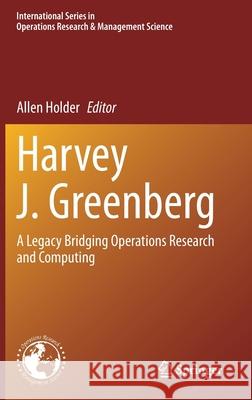Harvey J. Greenberg: A Legacy Bridging Operations Research and Computing » książka
topmenu
Harvey J. Greenberg: A Legacy Bridging Operations Research and Computing
ISBN-13: 9783030564285 / Angielski / Twarda / 2020 / 172 str.
Kategorie:
Kategorie BISAC:
Wydawca:
Springer
Seria wydawnicza:
Język:
Angielski
ISBN-13:
9783030564285
Rok wydania:
2020
Wydanie:
2021
Numer serii:
000904291
Ilość stron:
172
Waga:
0.43 kg
Wymiary:
23.39 x 15.6 x 1.12
Oprawa:
Twarda
Wolumenów:
01
Dodatkowe informacje:
Glosariusz/słownik
Wydanie ilustrowane
Wydanie ilustrowane











